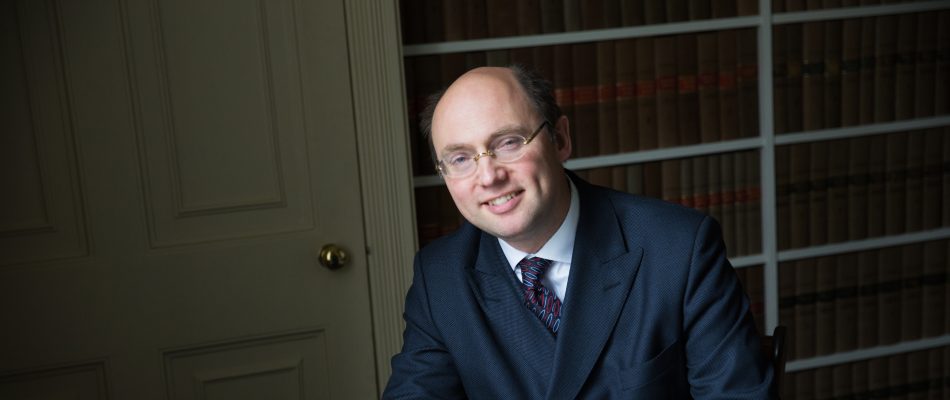Arguing the case for business

Professor Mark Watson-Gandy is one of the longest-serving subscribers to myBarrister (“the Rolls-Royce of the direct access websites” is how he kindly describes us). Barrister, author, lecturer, parent, Mark has plenty on his plate, all of which he relishes.
Mark Watson-Gandy had not really intended to take on direct access work. Already well established as a successful barrister (he was called to the Bar in 1990) and with the additional professional qualification as an accountant, he had plenty of work. However, lured by the offer of a free bottle of champagne to pose for a photo shoot being arranged by the Financial Times, which needed some stock photos of barristers, he found that direct access was an unexpected saviour.
Mark takes up the story: “Some years later, the FT ran a story about the threat posed by direct access to the traditional solicitor-barrister relationships, and, unbeknown to me, the paper wheeled out one of their stock photos of me to illustrate the story. The first thing I knew of this was that one of my regular a firm of solicitors was on the phone spitting feathers and saying, “If I didn’t want work from solicitors, I could have said so!” With my solicitor wholly unconvinced by my protestations of innocence, I thought I’d better be hung for a sheep as a goat and find out a bit more about direct access.”
That was quite a few years ago. Solicitors’ attitude to direct access have changed. Mark explains, “A fair number of the enquiries I get from myBarrister are from solicitors. Ironically, many firms have worked out that direct access, in fact, just opens the door to more flexible alternative ways of structuring the solicitor-barrister-client triangle”
These days, Mark is a member of Three Stone chambers, a set that was created out of the merger of two specialist chancery/commercial barristers’ chambers, Thirteen Old Square Chambers (Mark’s previous set) and 3 Stone Buildings. He has developing a thriving commercial practice, with a particular focus on insolvency.
Mark has been instructed in many interesting and high-profile cases. For example, he represented Craig Whyte in the case involving the Glasgow Rangers football club where Craig Whyte was sued in a £27 million claim involving the financing of his acquisition of the club. He has acted for, among others, the Nigerian Ports Authority, Silvio Berlusconi and the Tamil Nadu Electricity Board and drafted for the Dubai International Financial Centre their legislation on auditors. Most recently, Mark was instructed in a US$1.5 billion claim arising out of the Stanford International Bank liquidation in Antigua.
Mark also works pro bono for causes in which he believes, including in the parliamentary inquiry into the Gurkha veterans’ welfare, on the lobby for a “Samaritan defence” for St John Ambulance and for the Catholic church (for which Mark was made a Papal knight).
Having obtained his direct access qualification soon after barristers were permitted to work directly for members of the public, Mark has also enjoyed this aspect of the practice. Indeed, he feels there are significant benefits for direct access, notably on being in charge of fees. “With direct access, you control your fees and when they are paid. In the past, I often carried a lot of bad debt when being instructed by solicitors. Certain firms were notoriously bad when it came to paying counsel.
“This factor is felt more sharply now: barristers are now taxed on what we bill, not on what we receive, so that makes it all the more important that barristers stay on top of their cash flow. Get it wrong and a barrister could easily find himself insolvent.”
Insolvency is an area close to Mark’s heart. New editions of Mark’s two books on insolvency, Corporate Insolvency Practice and Personal Insolvency Practice, are shortly to be brought out by Wildys. “They are how to do it guides for insolvency litigation - guiding the reader through the special and quirky legal and procedural steps that apply,” Mark explains. “I thought it was important to have in one place, the legal extracts, the procedure and sample precedents you’d need to walk through the most common insolvency applications”
Mark also teaches, as visiting professor at the University of Westminster (since 1999), where he started the LLM course in corporate finance law, and at Cass Business School at City University.
It is not only university students whom Mark feels can benefit from learning about finance. In 2015, he set up KidsMBA to help 12- to 15-year-olds receive basic business education. Mark explains his thinking: “As an insolvency lawyer, you see so many businesses fail because of the fundamental mistakes made by their founders. It struck me that there is no training in schools to equip pre-school leavers with the basic business knowledge they need for self-employment or to start their own enterprise. I drafted a course and then brought in academics, entrepreneurs, lawyers, accountants and education psychologists to make sure that it fitted the bill.”
British schoolchildren are not the only ones benefiting from the education. KidsMBA is now being rolled out in several countries, each course being adapted for local conditions.
Mark can be contacted via myBarrister here.
Editor's picks


